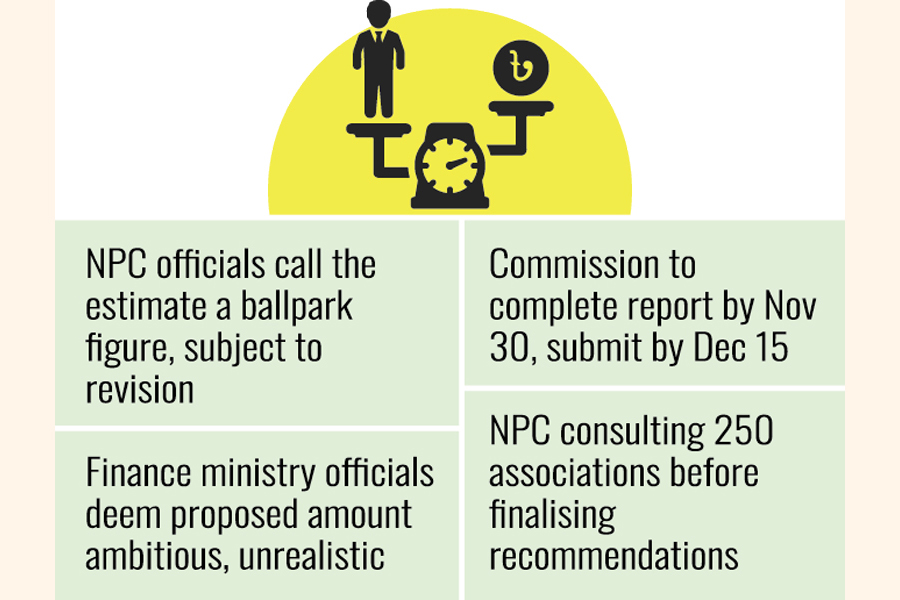New govt pay scale may cost Tk 700b more yearly
NPC's initial estimate equals nearly three months of tax revenue

Published :
Updated :

An initial estimate by the National Pay Commission (NPC) suggests the new government pay scale would require around Tk 700 billion more annually, including a hike in pensions, gratuities and medical allowances.
The amount is equivalent to nearly three months of the government's tax revenue collection and is almost double the current allocation for salaries and allowances of government officials in the last fiscal year.
NPC officials said the figure is a guesstimate, based on pay hike demands raised by government officials after a decade.
They described the estimate as a "ballpark figure" that may change once final recommendations are compiled from stakeholder consultations.
Economists said such an amount might be required if the demands of MPO-listed teachers, officials of state-owned entities, and increases in pensions and gratuities are incorporated into the new scale covering about 2.5 million government employees.
However, finance ministry officials have termed the amount ambitious and unrealistic, given the government's tight fiscal space.
The National Pay Commission 2025, formed in July to review and recommend pay hikes for government officials, is expected to complete its report by November 30, 2025 and submit the final version to the chief adviser by December 15, 2025.
A senior NPC member, familiar with the report's progress, said the commission is currently gathering recommendations from stakeholders, which will later be compiled and finalised.
"We have an initial estimate of an additional Tk 700 billion that the government may need to implement the new pay scale," the member said.
The commission will also suggest potential sources of funds to meet the increased expenditure, he added.
According to NPC members, there is a broad agreement on raising pensions, gratuities and medical allowances.
"We have, in principle, agreed to increase gratuity, pension and medical allowances in the new pay scale," another member said.
For medical benefits, the NPC is considering involving insurance companies to cover part of officials' medical expenses, with the rest borne by the government.
There are also strong recommendations from stakeholders to implement the revised pay scale within the current interim government's tenure. Government officials have proposed that pensions be made equivalent to their basic salary and gratuity funds converted to pensions.
"Offering 100 per cent of basic pay as pension won't be possible, but there will be a notable increase," the NPC member added.
On the pay ratio, he said the existing 1:9 ratio would be reduced, though it would not drop to 1:4 as some have speculated. Reducing the current 20-grade pay structure was also proposed, but the NPC may retain it, citing adjustment difficulties.
In FY26, the government allocated Tk 846 billion for salaries and allowances, up from Tk 790 billion in FY25 and Tk 680 billion in FY24.
Former World Bank chief economist Dr Zahid Hussain said any pay hike must be justified logically, given the shrinking fiscal space.
He noted that both public and private sector employees have faced real income erosion, as salary growth averaged 6.6 per cent in 2020, while inflation stood at 7.7 per cent.
"Salary hikes should be performance-based. Need-based adjustments were recommended earlier to curb excesses, but that approach has faltered," Dr Hussain added.
NPC officials said the commission has divided into four groups to consult with 250 associations as part of its stakeholder engagement process.
doulotakter11@gmail.com


 For all latest news, follow The Financial Express Google News channel.
For all latest news, follow The Financial Express Google News channel.